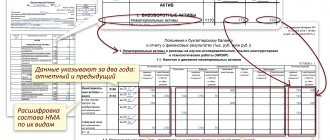Home / Constitution
Back
Published: 02/01/2020
Reading time: 8 min
0
3
- 1 How often to prepare reports
- 2 Deadlines for submitting balance sheets in 2020
- 3 What happens if you don’t submit your reports on time?
- 4 How often to prepare reports
- 5 When to submit a balance sheet if the reporting period is shortened or increased
- 6 Rules for filling out and signing
- 7 What small businesses submit to Rosstat
- 8 Approval of annual reporting
- 9 Publication of reports
- 10 Where and when are financial statements submitted?
How often to report
Currently, the state requires that a balance be submitted only once a year: on any suitable day from March 1 to March 31. Such deadlines for submitting the balance sheet are specified in both accounting (clause 2, article 18 of the Law “On Accounting” dated December 6, 2011 No. 402-FZ) and tax legislation (subclause 5, clause 1, article 23 of the Tax Code of the Russian Federation).
NOTE! The balance sheet for owners and other interested parties can be submitted at any other frequency (Clause 4, Article 13 of Law No. 402-FZ). Tax authorities and statistics do not need to submit such reports.
The balance sheet can be submitted to the Federal Tax Service both electronically and on paper. But with reporting for 2020, the rules change.
And from June 1, 2019, the forms of the balance sheet and other accounting records changed (Order of the Ministry of Finance dated April 19, 2019 No. 61n). The key changes are:
- now reporting can only be prepared in thousand rubles, millions can no longer be used as a unit of measurement;
- OKVED in the header has been replaced by OKVED 2;
- The balance sheet must contain information about the audit organization (auditor).
The auditor mark should only be given to those companies that are subject to mandatory audit. Tax authorities will use it both to impose a fine on the organization itself if it ignored the obligation to undergo an audit, and in order to know from which auditor they can request information on the organization in accordance with Art. 93 Tax Code of the Russian Federation.
More significant changes have occurred in Form 2. For more details, see.
There are two types of reporting: annual and interim (parts 3, 4 of article 13 of the Law of December 6, 2011 No. 402-FZ).
All organizations that are required to maintain accounting must prepare and submit financial statements at least annually. The reporting period for annual financial statements (i.e., reporting year) is the calendar year - from January 1 to December 31 inclusive. An exception is cases when an organization is registered, reorganized or liquidated in the middle of the year. This is stated in parts 1, 4 of Article 15, parts 3–5 of Article 13 of the Law of December 6, 2011 No. 402-FZ.
It will be necessary to prepare reports more often, for example monthly or quarterly, only if this is directly stated in the law, constituent documents or in the decision of the owner of the organization (Part 4 of Article 13 of the Law of December 6, 2011 No. 402-FZ). Such interim reports are generated on an accrual basis from the beginning of the year.
Deadlines for submitting reports for new and liquidated organizations
The period for which reporting is presented has different deadlines for newly formed enterprises, liquidated enterprises, and reorganized enterprises.
When submitting balance sheets of new enterprises:
- In the year of establishment of the enterprise, the period is calculated from the date of registration to the end of the year;
- Companies registered in the 4th quarter do not submit balance sheets for the current year period. The first reporting period is the next calendar year;
- Reporting is also submitted in the absence of activity.
The reporting period of a liquidated company is limited to the date of making an entry in the register about the termination of activities. Organizations undergoing liquidation submit 3 types of reporting. Generally established balance sheet forms in their original form or forms modified by enterprises are used.
| Form | Peculiarities |
| Interim liquidation balance sheet | Formed after the deadline for submitting creditor claims has expired |
| Final liquidation balance | Compiled after settlements with creditors |
| Latest reporting | The filing deadline is set no later than the day the entry on liquidation and exclusion of the organization from the register is made |
For liquidated organizations, the reporting period is calculated from January 1 of the year of liquidation to the date of filing the last reports. In the latest financial statements of the enterprise there are no indicators of economic activity. Standards for the composition of forms and the preparation of recent reports have not been established.
Balance due dates in 2020
The company's annual financial statements are submitted to the tax authority within three months after the end of the reporting year (subclause 5, clause 1, article 23 of the Tax Code of the Russian Federation). A similar deadline is established for submitting reports to statistical authorities (clause 2 of article 18 of Law No. 402-FZ).
The deadline for submitting reports for 2020 to the Federal Tax Service and Statistics is no later than March 31, 2020. But since March 31 is Sunday, the deadline is postponed to the next working day - April 1.
If you prepare interim financial statements for your own purposes (they are prepared optionally), you do not need to submit them to any regulatory authorities.
In 2020, the Tax Code of the Russian Federation does not establish the obligation of organizations to submit financial statements to the tax office in electronic form. Filing reports electronically is a taxpayer's right.
Therefore, companies have the right to send reports to the Federal Tax Service on paper. To do this, the head of the company or his representative can personally contact the inspectorate. Or documents can be sent by mail with a list of attachments.
As for accounting reports to the statistical institution, it is also allowed to be submitted on paper. There is no legal obligation to report online.
Meanwhile, the Federal Tax Service recommends sending the TCS report to those who submit other reports electronically.
Table of upcoming changes for the chief accountant Will help you avoid mistakes in the 2nd half of 2020 All accounting changes that came into effect from July 1, 2020 Easy to use in your work
Example of filling out a balance sheet
LLC "Flags" was created in 2020. At the end of the year, the chief accountant (who is also the director) compiled a balance sheet based on the balance sheet for the accounting accounts. Since this is the first year of activity, there are no figures for the previous two years. Account balances are presented in the table.
| Account debit balance | Amount, thousand rubles | Account credit balance | Amount, thousand rubles |
| 01 | 100 | 02 | 14 |
| 10 | 74 | 60 | 40 |
| 19 | 37 | 62 | 45 |
| 50 | 15 | 66 | 39 |
| 51 | 88 | 69 | 14 |
| 70 | 37 | ||
| 80 | 10 | ||
| 84 | 115 |
Line 1150 of the balance sheet records the difference between accounts 01 and 02, that is, the residual value of fixed assets is reflected.
Balances on account 10 are entered in line 1210. VAT must be taken into account in line 1220. All funds are reflected in line 1250 of the balance sheet asset (15 + 88 = 103).
For authorized capital there is line 1310, and for retained earnings there is line 1370.
The balance of account 66 (loans) is reflected in line 1510. All debt to creditors is in line 1520 (40 + 45 +14 +37 = 136).
At the end of filling out the balance, you need to compare lines 1600 and 1700 - they must be equal. In the example, the balance sheet total is 300 thousand rubles.
Download a sample balance sheet
Download a blank balance sheet
Submit your financial statements on time and without errors! We are giving access for 3 months to Kontur.Ektern!
Try it
What happens if you don’t submit your reports on time?
If financial statements are not submitted to the Federal Tax Service of Russia on time, the inspectorate may fine the organization under Article 126 of the Tax Code of the Russian Federation. The fine is 200 rubles. for each document included in the reporting that tax inspectors received late.
Balance sheet (see filling out the balance sheet), Statement of financial results, Statement of changes in capital, Statement of cash flows (see ODDS for filling out procedures), explanations in tabular and text forms. If an organization fails to submit its financial statements on time, the fine will be 1,000 rubles. (200 rub. × 5).
In addition, for late submission of financial statements at the request of the tax inspectorate, the court may impose a fine in the amount of 300 to 500 rubles from the responsible employee (for example, the head of an organization). (Part 1 of Article 23.1, Part 1 of Article 15.6 of the Code of Administrative Offenses of the Russian Federation).
In each specific case, the perpetrator of the offense is identified individually. In this case, the courts proceed from the fact that the manager is responsible for organizing accounting, and the chief accountant is responsible for its correct maintenance and timely preparation of reports (clause 24 of the resolution of the Plenum of the Supreme Court of the Russian Federation of October 24, 2006 No. 18).
- the organization did not have a chief accountant at all (resolution of the Supreme Court of the Russian Federation dated June 9, 2005 No. 77-ad06-2);
- accounting was carried out by a specialized organization, and it also compiled reporting (clause 26 of the resolution of the Plenum of the Supreme Court of the Russian Federation of October 24, 2006 No. 18);
- the reason for the violation was a written order from the manager, with which the chief accountant did not agree (clause 25 of the resolution of the Plenum of the Supreme Court of the Russian Federation of October 24, 2006 No. 18).
We invite you to familiarize yourself with the Acceptance Certificate for the Transfer of Property to the Commission || Act of acceptance of transfer of property to the commission
If you fail to submit financial statements to Rosstat on time or submit them incompletely, an administrative fine will be charged.
An official of an organization faces a fine of 300 to 500 rubles. (to the manager). The organization itself can be fined from 3,000 to 5,000 rubles.
Such sanctions are provided for in Article 19.7 of the Code of the Russian Federation on Administrative Offenses (letter of Rosstat dated February 16, 2016 No. 13-13-2/28-SMI).
Similar separate fines will apply for late submission of an audit report to Rosstat.
Interim financial statements 2020
From May 7, 2020, the preparation of interim reporting officially ceased to be mandatory for all organizations on the basis of Order of the Ministry of Finance dated April 11, 2018 No. 74n. The order canceled clause 29 of the Regulations on Accounting and Reporting, which required the preparation of interim reporting by everyone who is not exempt from it by law. Similarly, the decision of the Supreme Court of the Russian Federation canceled paragraph 48 of PBU 4/99. Currently, it is necessary to prepare and submit interim reporting only in cases where this obligation is provided for:
- legislation;
- regulatory legal acts;
- contracts;
- constituent documents.
For example, quarterly reporting is required for insurance organizations and securities issuers. If your organization does not fall under these conditions, it is obligatory to prepare only annual reports, but it is possible and useful to prepare interim reports on your own initiative.
Submission of interim reporting to tax authorities and statistical authorities is not required. But interim reporting may be required when concluding agreements with counterparties, obtaining a bank loan, or at the request of the founder. In addition, interim reporting helps to monitor the situation, forecast financial results and verify the reliability of accounting data.
How often to report
The composition of the financial statements that the organization must submit is determined in accordance with Article 14 of the Law of December 6, 2011 No. 402-FZ, PBU 4/99 and Order of the Ministry of Finance of Russia of July 2, 2010 No. 66n.
Which reporting forms will need to be submitted depends on whether the enterprise is commercial, budget-funded, or whether it is a small business entity (SMB).
A commercial organization submits the following package of reporting forms:
- Balance sheet;
- Income statement;
- Attachments (statement of changes in equity, statement of cash flows and an appendix with a breakdown of the main lines of the balance sheet and income statement).
SMEs that are not subject to mandatory audit criteria have the right to provide simplified financial statements. It is distinguished by aggregated indicators grouped by articles and the absence of detailed transcripts. It is necessary to understand that this opportunity exists regardless of the taxation system. That is, both organizations using the simplified tax system may be required to submit basic detailed forms, and enterprises using the simplified tax system may provide simplified reporting.
For non-profit enterprises, the reporting includes a report on the intended use of funds instead of a report on financial results.
Advice: Every year before submitting the balance sheet, you should check whether the reporting forms have changed.
The form of the accounting report and appendices was approved by Order of the Ministry of Finance 66n dated 07/02/2010 and when writing the accounting policy, it can be supplemented, if necessary, with any number of lines, but it is not allowed to exclude any information from the established forms. When finalizing the form of the document, we must not forget that the financial statements must be:
- Reliable;
- Informative for users of the report in order to make economic decisions based on the data obtained;
- Compiled on the basis of data from accounting registers.
Remembering that the balance sheet is not only a report for regulatory authorities, but also an opportunity to check the state of accounting and assess the economic stability of the enterprise, drawing up such a document no longer seems like a burden.
When to submit a balance sheet if the reporting period is shortened or extended
Typically the reporting period is one year. During this time, you need to draw up a balance sheet and submit it to all authorities within the established time frame.
But you can register and start working from any date within the calendar year, and then the reporting period will be shorter than traditional. At the same time, the deadline for preparing the balance sheet is usual: within 3 months after the end of the reporting period.
Another case is the liquidation of a company. For such a company, the reporting period ends with the date of entry into the Unified State Register of Legal Entities on liquidation (Article 17 of Law No. 402-FZ), and the same 3-month period applies for the preparation and submission of reports.
For more information about where the liquidation balance sheet is submitted, read the material “Where to submit the liquidation balance sheet.”
An extended reporting period occurs when the decision to start a business is made at the end of the year and registration occurs after September 30 (for example, in October 2020). Then, according to paragraph 3 of Art. 15 of Law No. 402-FZ, the reporting period increases and lasts from October 1, 2020 to December 31, 2020. Such an increase does not affect the deadline established by law for submitting the balance sheet.
{amp}gt; Results
Reports must be submitted no later than the deadlines established by law. Failure to submit a balance or delay in submitting it will result in penalties.
{amp}gt;Rosstat: what we hand over in 2020
New error correction procedure
The Federal Tax Service clarified that if an accountant discovers an error in the financial statements, he will be able to submit an adjusted balance sheet and other forms only no later than 10 business days from the day following the day the correction was made or the day the annual accounting (financial) statements were approved. For different organizations, these are different deadlines for sending corrected reports to the Federal Tax Service:
- for limited liability companies - 10 working days after April 30;
- for joint stock companies - 10 working days after June 30.
If the reporting is submitted after the above deadlines, it will be placed in the State Inspectorate of BO in its original form, that is, with an error. In this case, it will be impossible to correct it, and this will lead to a fine.
Rules for filling and signing
Prepare financial statements in Russian (clause 15 of PBU 4/99). Report numerical data in thousands or millions of rubles (without decimal places). Indicate financial reporting indicators that have a negative value (for example, the amount of uncovered loss) in parentheses. In the same order, reflect the data that needs to be subtracted from other indicators.
Accounting statements are considered prepared after they are signed on paper by the head of the organization (Part 8 of Article 13 of the Law of December 6, 2011 No. 402-FZ). If accounting is carried out by a specialized organization, then the financial statements must be signed by the heads of both organizations, that is, the one that provides accounting services (clause 17 of PBU 4/99).
The signature of the chief accountant on reports submitted to Rosstat is not required. This follows from Article 18 of the Law of December 6, 2011 No. 402-FZ. Rosstat came to this conclusion in letter dated April 7, 2020 No. 532/OG.
The signature of the chief accountant is not required in the accounting reports submitted to the Federal Tax Service. This is not provided for by current legislation.
Situation: who, instead of the head of the organization, can sign the financial statements? The organization has its own accounting department.
This can be done by any employee authorized by the head of the organization.
The manager can delegate part of his powers (including the right to sign financial statements) to other employees. For example, to your deputy, financial or commercial director. To do this you need:
- issue an order appointing someone responsible for signing the financial statements;
- issue the employee a power of attorney for the right to sign financial statements (subclause 2, clause 3, article 40 of the Law of February 8, 1998 No. 14-FZ, article 69 of the Law of December 26, 1995 No. 208-FZ, clause 5 of Art. 185 of the Civil Code of the Russian Federation).
If such documents are drawn up correctly, then the signature of an authorized employee on the financial statements is equal to the signature of the head of the organization.
The manager can transfer the right to sign to another individually, without coordinating this with the founders, board of directors or shareholders. Provided, of course, that a different procedure is not provided for by the organization’s constituent documents.
An important detail: a power of attorney is required - one order appointing someone responsible for signing the statements is not enough. The legislation does not provide that anyone other than the manager (general director, president, etc.) has the right to act on behalf of the organization and represent its interests without a power of attorney.
We suggest you read: When do you need a birth certificate?
Such conclusions are confirmed by letters of the Ministry of Finance of Russia dated September 25, 2012 No. 03-02-07/1-227, Federal Tax Service of Russia dated June 26, 2013 No. ED-4-3/11569.
Situation: is it possible to put a facsimile signature of the head of the organization on financial reporting forms?
No you can not.
Facsimiles can be used only in cases provided for by law (clause 2 of Article 160 of the Civil Code of the Russian Federation). But the accounting law does not directly allow the use of a facsimile signature. But it says that the manager must sign the financial statements personally, on paper (Part 8 of Article 13 of the Law of December 6, 2011 No. 402-FZ).
What does a small business submit to Rosstat?
The obligation to submit statistical reports for small and medium-sized businesses is enshrined in Art. 5 of the Federal Law of July 24, 2007 No. 209-FZ. Such organizations most often submit reports to Rosstat using a simplified scheme, and some do not report at all.
Rosstat conducts two types of monitoring of the activities of companies and individual entrepreneurs:
- continuous, when accounting forms are submitted with a mark of acceptance from the tax authorities;
- selective, when the company is included in the sample and already submits statistical reporting in addition to accounting.
Statistical reporting forms in a situation where your company is included in the sample are provided to the statistical authorities, along with explanations and comments on their completion. As a rule, this is a report in Form No. 1-IP, but statistical authorities may ask you to provide additional forms. Therefore, we will not focus on submitting statistical reports.
1) via electronic communication channels, using an electronic digital signature. The same forms of financial statements are provided to Rosstat as to the tax authorities. To transfer data, just enter “Kontur-Extern” (tab “Statistical reporting” - “Accounting statistical reporting”), check the boxes next to the required forms, select the recipient and click “Submit”.
2) by mail, reports can be submitted to statistical authorities by simple registered mail without an inventory and notification;
3) personally or through an authorized representative bring reports to the statistical authorities.
If the company has not received notification from the statistical authorities that it was included in the sample, it is necessary to prepare financial statements for submission in the usual form. You provide the statistical authorities with a certified copy of the balance sheet (without explanations) and a copy of the financial results statement, with a note from the tax authority about the acceptance of the statements, until March 31, 2017.
Question: This is our first time submitting reports to the statistical authorities and we don’t know which department to submit them to. The statistics codes do not indicate which statistics department we belong to, and there is no such information on the Goskomstat website either. Where can I find this information?
Answer: indeed, in the statistics codes there are no identifying marks indicating which statistical body the company should submit reports to. If you submit reports to statistical authorities via electronic communication channels, then they are automatically submitted to the required department. But if you submit a report to the statistical authorities in person or by mail, then you can find out your branch using simple logical deductions:
- first you need to know which tax office you are registered with;
- Next, look at which district your inspection belongs to. It is in the same district that you need to submit reports to the statistical authorities.
Common reporting errors
Errors may occur when preparing to submit financial statements.
| Index | Error | Explanations |
| Balance price | Inequality of liability and asset indicators form 1 | Data inconsistencies may arise due to incorrect rounding, incorrect transfer of the balance of retained earnings (uncovered loss), or an arithmetic error. Elimination of inequalities is carried out by checking the indicators of the general ledger, account turnover and information from primary forms |
| Explanations | Lack of information on the correction of errors of previous periods that arose after the reporting was submitted | Enterprises must disclose information in an explanatory note about the nature of the error, period, amount and procedure for adjustment |
| Linking forms | Inconsistency between indicators of different forms | To check the data, you need to use formulas for the mutual linkage of articles of the submitted reporting forms |
An example of an error in the balance sheet, which resulted in a discrepancy between assets and liabilities. The Micron organization has long-term receivables, the amount of which at the end of the year amounted to 360 thousand rubles up to 90 days. The unused reserve created by the enterprise was restored. At the same time, a new reserve was created in the amount of 180 thousand rubles. In the balance sheet, the organization reflected the amount of receivables and reserves in full. As a result, balance sheet indicators were distorted. Correct indication of the debt minus the reserve. After correcting the errors, the discrepancies were eliminated.
Approval of annual reports
The annual financial statements must be approved (Part 9, Article 13 of the Law of December 6, 2011 No. 402-FZ). The decision on this is made by the general meeting of shareholders (participants) (subparagraph 11, paragraph 1, article 48 of the Law of December 26, 1995 No. 208-FZ, subparagraph 6, paragraph 2, article 33 of the Law of February 8, 1998, No. 14 -FZ). Such a decision must be formalized in the minutes of the general meeting (Article 63 of the Law of December 26, 1995 No. 208-FZ, paragraph 6 of Article 37 of the Law of February 8, 1998 No. 14-FZ).
There are no mandatory requirements for the minutes of the meeting of LLC participants in the legislation. But there are details that must be provided. This is the number and date of the minutes, place and date of the meeting, agenda items, signatures of the founders. The minutes of the general meeting of shareholders differ from the minutes of an LLC in that they are drawn up in duplicate and have mandatory details. These signs are listed in paragraph 2 of Article 63 of the Law of December 26, 1995 No. 208-FZ.
An example of how to draw up minutes of a general meeting of LLC participants. Approval of annual financial statements
The charter of Torgovaya LLC stipulates that annual financial statements are approved no later than March 20 of the following year. At the general meeting of participants, which took place on March 19, 2020, the financial statements were approved. The decision was made unanimously. The minutes of the general meeting of participants are compiled as follows.
Attention: the current legislation does not provide for liability for the fact that the annual financial statements are not approved. But a fine is possible for failure to submit such reports to shareholders for approval.
Administrative liability in this case is established by Part 2 of Article 15.23.1 of the Code of the Russian Federation on Administrative Offences. This provision provides for punishment, in particular, for failure to provide or violation of the deadline for providing mandatory information (materials) in preparation for the general meeting of shareholders. Such materials also include the organization’s annual financial statements (Part 3 of Article 52 of the Law of December 26, 1995 No. 208-FZ).
The fine will be:
- for an organization – from 500,000 to 700,000 rubles;
- for officials – from 20,000 to 30,000 rubles. or disqualification for up to one year.
Situation: is it possible to submit to the tax office annual financial statements that were not approved at the general meeting of participants (shareholders)? The deadline for filing reports expires before the date for which the general meeting is scheduled.
We suggest you familiarize yourself with How to properly exchange a car for a car key to key?
Yes, you can.
As a general rule, accounting (financial) statements are considered prepared after a paper copy is signed by the head of the organization (Part 8, Article 13 of Law No. 402-FZ of December 6, 2011).
But indeed, the period during which the annual financial statements must be submitted to the tax office does not coincide with the period during which they must be approved by the general meeting of the organization’s founders. Thus, the annual reporting of an LLC must be approved no earlier than two, but no later than four months after the end of the reporting year (paragraph 2 of Art.
The annual financial statements must be submitted to the tax inspectorate no later than three months after the end of the reporting year (subclause 5, clause 1, article 23 of the Tax Code of the Russian Federation). This deadline cannot be moved - the law does not provide for this. And for late submission of reports, the organization, its manager and (or) chief accountant may be fined.
So it turns out that annual financial statements must be submitted to the tax office, even if they did not have time to approve them at the general meeting.
What's happened?
The Federal Tax Service of Russia reminded all organizations that the legislation of the Russian Federation provides for the obligation of economic entities that maintain accounting records to submit annual accounting (financial) statements according to the general rule:
- to Rosstat;
- to the Federal Tax Service.
In addition, other legislative acts provide for the submission of accounting (financial) statements in the event that an organization carries out certain types of economic activities, to other supervisory authorities, for example, the Central Bank of the Russian Federation. But for the vast majority of organizations, the excess administrative burden has been removed. Now they can submit annual financial statements using the “one window” principle. For the first time, economic entities will report according to this scheme for 2020. Therefore, the Federal Tax Service explained how it works.
Publication of reports
The organization must publish reports in cases provided for by law (clause 9 of article 13 of the Law of December 6, 2011 No. 402-FZ). Thus, public joint stock companies are required to publish their annual financial statements. This follows from paragraph 1 of Article 66.3 and paragraph 6 of Article 97 of the Civil Code of the Russian Federation, as well as paragraph 1.
Joint stock companies publish the text of their annual financial statements on their website on the Internet. The period is three days from the date of drawing up the auditor’s report on the reliability of the reporting. In any case, accounting reports should be published no later than three calendar days from the date on which the deadline for its submission to Rosstat expired (clause 71.4 of Bank of Russia Regulation No. 454-P dated December 30, 2014).
For 2020, statistics must be reported by March 31, 2020 inclusive. The deadline for publication of the financial statements along with the auditor's report is April 4. If you are late with publication, there will be a fine. The Bank of Russia warns about this in its information letter dated March 30, 2020 No. IN-06-52/17.
LLCs are required to do this only if they openly place bonds or other equity securities (Clause 2, Article 49 of Law No. 14-FZ of February 8, 1998).
The requirements for mandatory publication of reporting also apply to organizations that use the simplified tax system (letter of the Ministry of Finance of Russia dated June 18, 2008 No. 07-05-06/137).
Attention: for violation of legal requirements on disclosure of information by the issuer, administrative liability is provided (Part 2 of Article 15.19 of the Code of Administrative Offenses of the Russian Federation).
The penalty is a fine. In this case, the amount of the fine is:
- from 700,000 to 1,000,000 rubles. – for the organization;
- from 30,000 to 50,000 rub. – for officials (or disqualification for a period of one to two years).
The costs associated with the publication of financial statements are administrative (clause 7 of PBU 10/99). Therefore, in accounting, reflect them on account 26 or account 44 (for trading organizations). When calculating income tax, take into account the costs of publishing annual reports as part of other expenses (subclause 20, clause 1, article 264 of the Tax Code of the Russian Federation).
How to prepare reports?
You can prepare financial statements in any convenient way: yourself (on paper or on a computer), using accounting programs, a real accountant, outsourcing or in a cloud service. What to choose is up to you. It is worth proceeding from the conditions, cost, free time and convenience. One of the most convenient ways remains filing reports in a cloud service.
Internet accounting “My Business” allows you to automatically generate and fill out basic accounting reporting forms, including a simplified version of reporting. All reporting is generated using an electronic wizard that will guide you through all stages of filling out the report and give you tips. The service issues an electronic signature for sending reports free of charge, and you will track the status of sent reports in your personal account.






